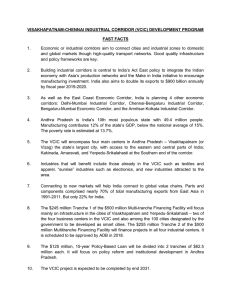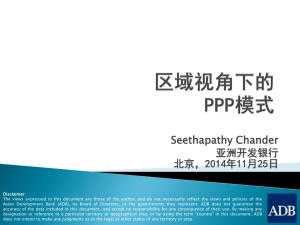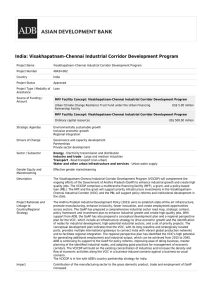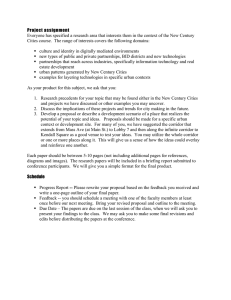ADB`s Support for Industrial Corridor and Smart Cities in Andhra
advertisement
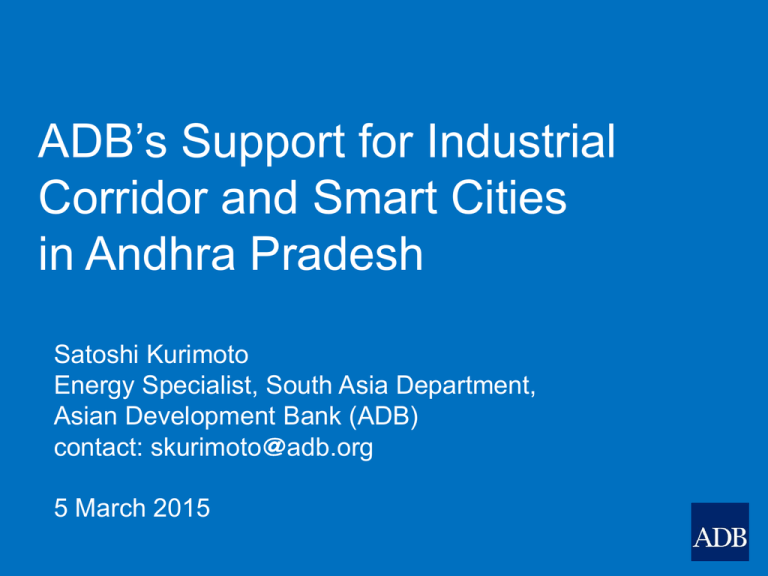
ADB’s Support for Industrial Corridor and Smart Cities in Andhra Pradesh Satoshi Kurimoto Energy Specialist, South Asia Department, Asian Development Bank (ADB) contact: skurimoto@adb.org 5 March 2015 Contents • General Information on ADB • Vizag-Chennai Industrial Corridor (VCIC) • Transforming Vizag into a Smart City • Conclusion ADB’s President Takehiko Nakao met with Prime Minister Narendra Modi (5 February 2015) • ADB is planning to maintain the high lending level of $7-$9 billion during 2015-2017. • ADB will continue to finance new and improved roads and urban infrastructure, as well as renewable energy, including the development of solar parks and transmission lines. • In addition, ADB will support the development of industrial and economic corridors. ADB is working with the government on the Vizag-Chennai Industrial Corridor with a renewed focus on the manufacturing sector. • ADB will also assist development of 10-20 smart cities. General Information on ADB Asian Development Bank (ADB) • Founded in 1966 • 67 Members • Capital $153.1 billion (end 2014) – Japan (15.7%), United States (15.6%), PRC (6.5%), India(6.4%), Australia (5.8%) • Annual Loan/Investment Approval $13.1 billion (2014) • Staff : 2,990 (December 2014) Our Products Two areas of operations Financial Assistance Sovereign operations Nonsovereign operations Four types of TA Technical Assistance Project preparation Capacity development Policy advisory Research & development Examples Knowledge services Seminars, workshops, publications Vizag-Chennai Industrial Corridor (VCIC) Vizag-Chennai Industrial Corridor (VCIC): A key part of the East Coast Economic Corridor (ECEC) and best suited to execute India’s “Act East Policy” ECEC VCIC Conceptualizing and planning for the corridor Components Indicative timeline Phase 1 - Conceptual development plan for the VizagChennai Industrial Corridor • Industries for future development including MSMEs • Nodes for industrial development • Set of priority projects • Recommendations on streamlining the business and regulatory processes at the State Phase 2 - Preparation of comprehensive regional perspective plan • Transport strategy • Energy strategy • Urban strategy • Funding requirement Submitted to GoI and GoAP - December 2014 December 2015 • Implementation of highest priority interventions for improving policy and regulatory environment in the state Master plans for selected nodes June 2016 Four Industrial Nodes in VCIC 1.Visakhapatnam Tamil Nadu Andhra Pradesh 2. East Godavari 1 NH 16 alignment 3.West Godavari Vishakhapatnam Node 2 3 4. Krishna 4 Kakinada Node 5. Guntur Four nodes have been identified 5 Gangavaram – Kankipadu Node 6 6. Prakasam ► Vishakhatpatnam Node ► Kakinada Node ► Gangavaram – Kankipadu Node 8. Kadapa 8 7.Nellore 7 ► Yerpedu – Srikalahasti Node ADB is requested to prepare master plan Yerpedu – Srikalahsti Node 9 9.Chittoor 10 10.Tiruvallur 11 11.Chennai for Two Nodes (Vizag, YerpeduSrikalahasti) Industry: Food Processing, Textiles and Chemicals will continue being major contributor. Sectors like Electronics and Pharmaceuticals will grow faster. BIS 2034-35 BIS 2014-15 Food Processing, 22.0% Others, 20.0% Food Processin g, 23.1% Others, 20.0% Electroni cs, 6.0% Textiles, 13.8% Auto, 0.3% INR 1,100 bn Chem & Petroche m, 20.8% Metallur gy, 13.9% Pharma, 2.1% Electronics, 11.7% INR 7,823 bn Textiles, 13.2% Auto, 1% Chem & Petrochem, 19.9% Metallurgy, 7.7% Pharma, 5.3% Infrastructure Strategy for the Corridor: Enabling Strong Gateways, Spinal and Grid Connectivity Nodes and Gateways Each node has been identified in proximity to key gateways, whose performance is critical for competitiveness of the corridor Road Network Strengthening the arterial roads and rail networks of the corridor is also critical for the competitiveness of the corridor Principles for industrial policy: Must expand industrial production, employment, and productivity simultaneously This requires – Encouraging: • Both capital and labor intensive sectors • A growth-oriented approach to MSMEs (expansion, adopting new technologies, formalizing, and linking with larger firms and modern supply chains) – Sensitivity to the value chain – Tackling binding constraints to firm growth • Infrastructure • Regulations, e.g., easing entry and exit norms • Skills Andhra Pradesh Industrial Corridor Development Program: Policy Loan ($100 million) to support policy, institutional, and governance reforms to promote accelerated industrial development and enhance VCIC’s competitiveness in “Ease of Doing Business” Investment Project of $600 million (ADB-$400 million): • internal infrastructure in industrial clusters • Transport infrastructure such as connectivity of nodes to ports, urban areas, other nodes • Power infrastructure (transmission and distribution) • Infrastructure and advisory support for smart cities • Skill development and capacity enhancement • Capacity building of institutions in corridor management and industrial development • Project management support Transforming Vizag into a Smart City Smart Cities- Key Components Economic Character Funding, Investments, Ease of Doing Business and Sustainability Transport Multimodal Public Transport and Mass Transit Utilities Smart/Micro Grid, Water, Energy, Infrastructure Safety Public Safety, Critical Infra Security, Police, Fire Liveability Green Space, Renewables, Health, Education, Assisted Living, Citizen Participation ICT Comms Network, Platform, Device City Gateway Airport, Railways, Highway Government e-governance, Resource Utilization, Operations Efficiency WARNING 24 HOUR SURVEILLANCE Shared Infrastructure Utility Tunnels, Shared Poles/Ducts/Conduits, Rights-of-Way, Utility Notification Centre (Call before you dig) Why? Smart Visakhapatnam: Realizing “Make in India” by “Acting East” Key Demographics • Population: 2 million, mid-size city, manageable • Area: 544 km2 ; Vehicles: 0.55 Million • Port city: Manufacturing hub linked to Southeast Asia and East Asia • Institutions: Railways, Navy, Port, Steel city, IT, Andhra University • Urban basic services: One of the best in India • New State: Commercial capital of Andhra Pradesh • VCIC & PCPIR: Visakhapatnam Node – High potential Visakhapatnam: Gap Analysis* (1/2) •Physical Infrastructure Gap Water Supply • 24x7 supply of water supply absent due to high level of non-revenue water (benchmark: 100%) Sanitation Coverage • Sewerage connections in 60% households (benchmark: 100%) • Need to construct the wastewater treatment plants with energy efficient and mechanized treatment processes • Need to implement septage management in GVMC * as per 2014 Status of Basic Services, GOAP Visakhapatnam: Gap Analysis (2/2) Solid waste management – 100% SWM: However, door-to-door collection and segregation at source are 30-35%. Drainage – Only 35% of road networks have roadside drains. On average 20 flooding incidents reported in a year. Electricity, Telephony and ICT • 95% households have electricity connections Interrupted supply during summers Currently no focus on green buildings • 90% telephone coverage Transport – Inadequate mass transport system (within 800m distance) Broad Framework for Smart City Infrastructure – Industrial Infrastructure: To make manufacturing competitive and realize “Make in India” – Urban infrastructure: Globally livable and sustainable city for attracting investment and talent – Improving the quality of life of the residents Technology – ICT to drive productivity and quality services – Green technology – reduce waste and energy efficiency Institutions – Empowered local city government – Citizens, private sector, investors Recommended Smart City Initiatives for Vizag (1/2) Phase 1 Services related to Social Infrastructure • Citizen Service Delivery System & e-Governance • Geospatial System (GIS) Services related to Urban Infrastructure • Energy (both at individual and city level – solar and wind energy) & Water Management • Emergency & Disaster Management • Participatory & Connected Government • Transport & Traffic Management • Healthcare & Education • Public safety and Surveillance Recommended Smart City Initiatives for Vizag (2/2) Phase 2 Services related to Social Infrastructure Services related to Urban Infrastructure • Social Inclusion • Solid Waste Management • Community Mapping • Sewage Management • Environment Sustainability • Smart Buildings • City Wide Wi Fi 22 Conclusion ADB will work for: • Making AP State more business friendly – Infrastructure development (connectivity, power, water, transport, urban development, etc.) – Enhancement of ease of doing business (policy and institutional framework) • Contribution to make Smart Cities in AP Your Input would be highly appreciated.
